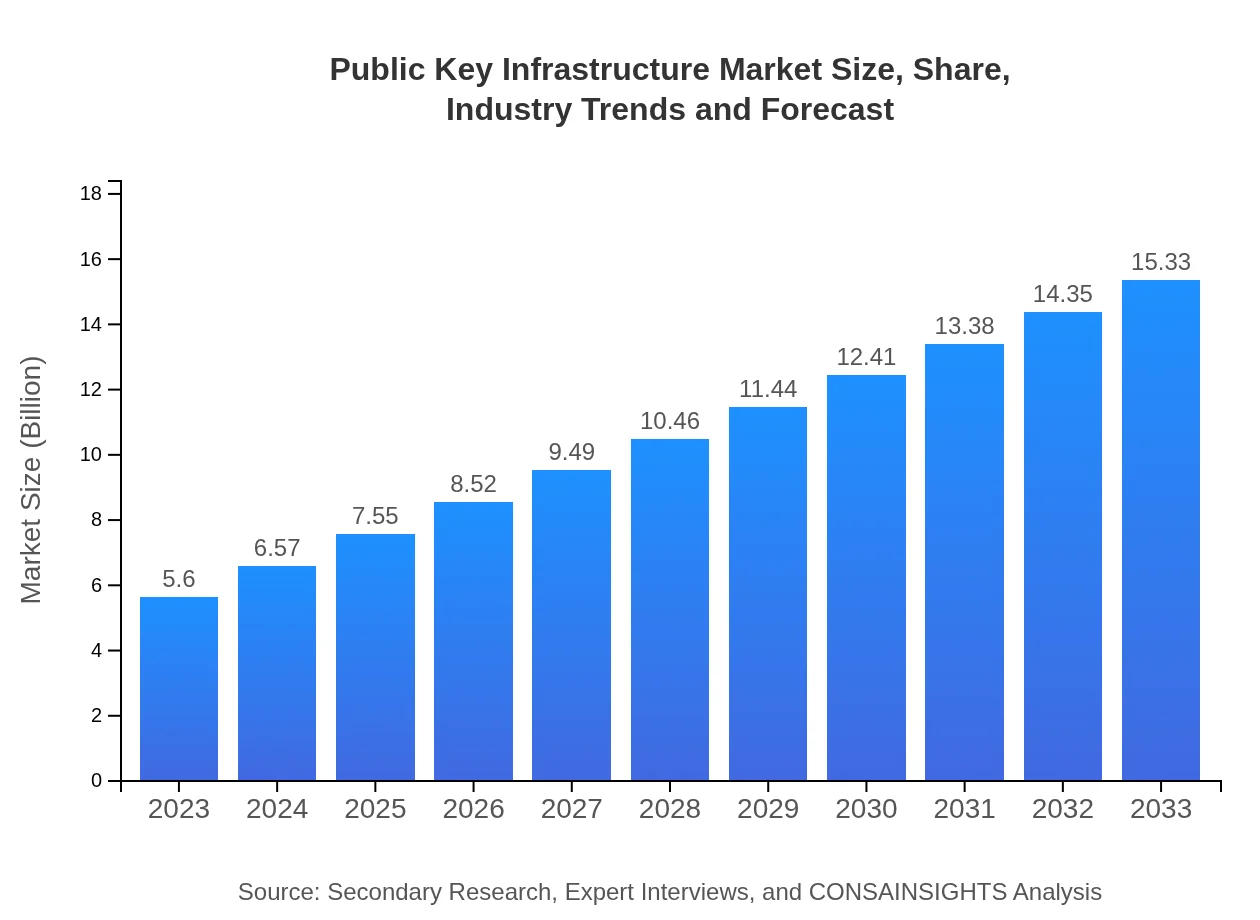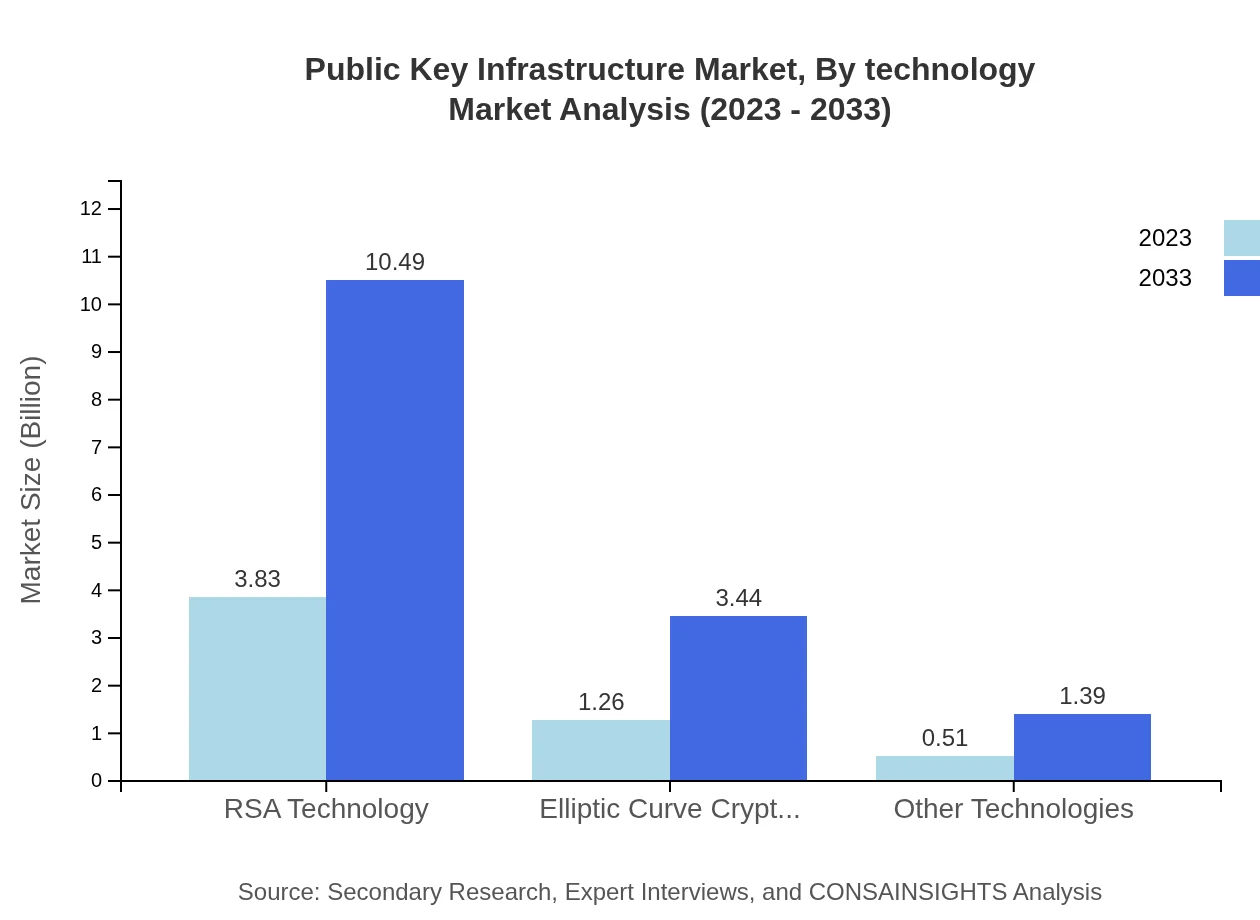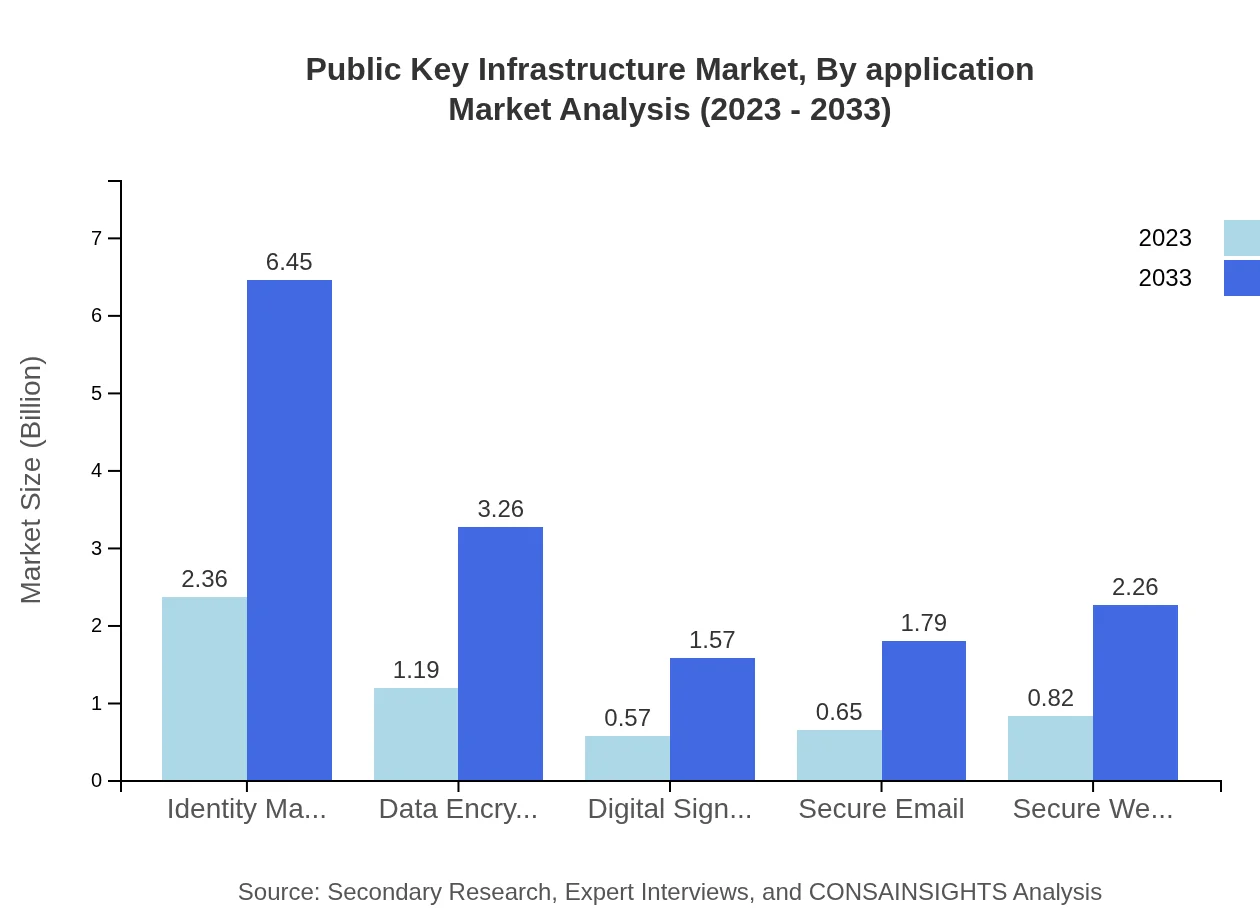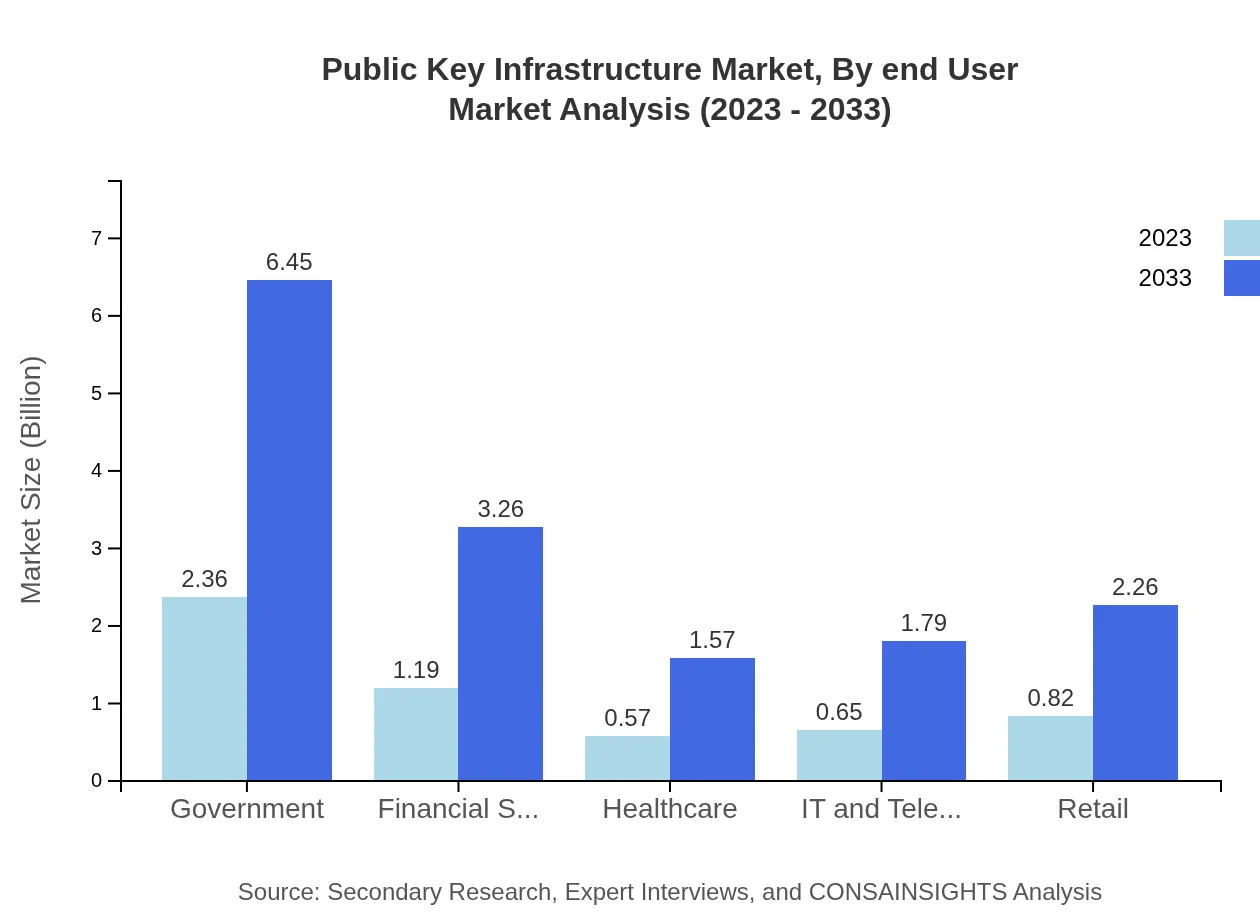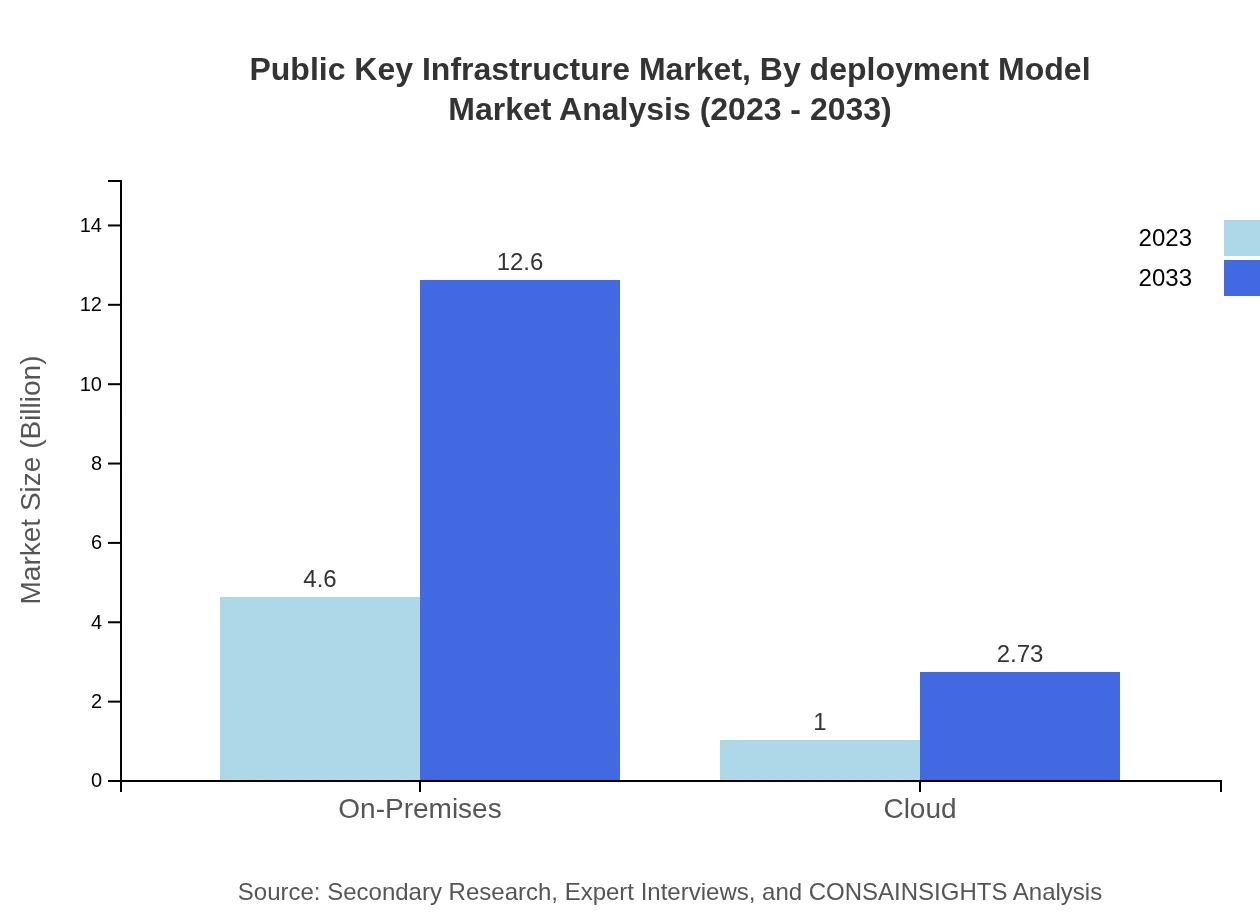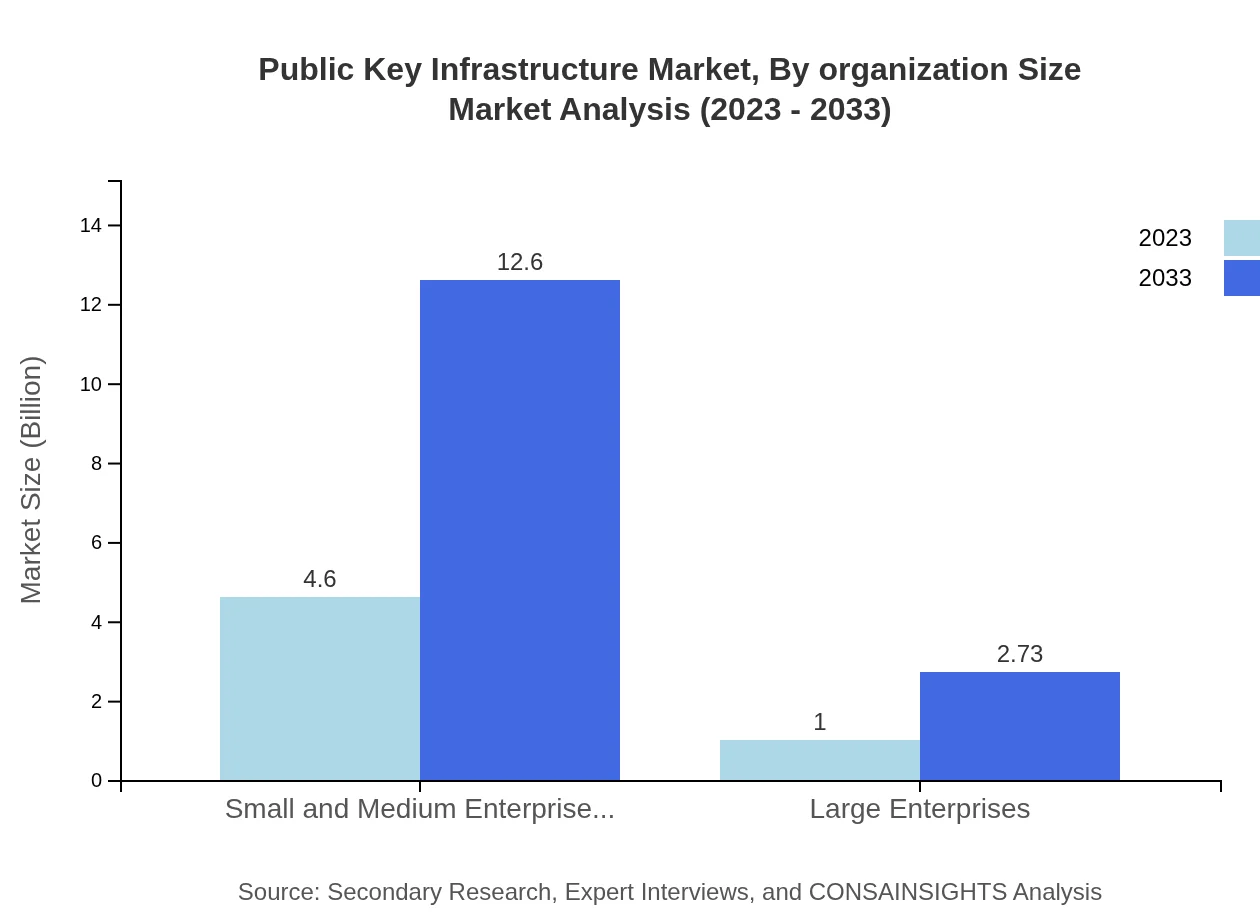Public Key Infrastructure Market Report
Published Date: 31 January 2026 | Report Code: public-key-infrastructure
Public Key Infrastructure Market Size, Share, Industry Trends and Forecast to 2033
This report provides an in-depth analysis of the Public Key Infrastructure (PKI) market from 2023 to 2033, highlighting market dynamics, size, trends, and forecasts, alongside regional insights and competitive landscapes of leading players.
| Metric | Value |
|---|---|
| Study Period | 2023 - 2033 |
| 2023 Market Size | $5.60 Billion |
| CAGR (2023-2033) | 10.2% |
| 2033 Market Size | $15.33 Billion |
| Top Companies | DigiCert, Sectigo, Entrust |
| Last Modified Date | 31 January 2026 |
Public Key Infrastructure Market Overview
Customize Public Key Infrastructure Market Report market research report
- ✔ Get in-depth analysis of Public Key Infrastructure market size, growth, and forecasts.
- ✔ Understand Public Key Infrastructure's regional dynamics and industry-specific trends.
- ✔ Identify potential applications, end-user demand, and growth segments in Public Key Infrastructure
What is the Market Size & CAGR of Public Key Infrastructure market in 2023?
Public Key Infrastructure Industry Analysis
Public Key Infrastructure Market Segmentation and Scope
Tell us your focus area and get a customized research report.
Public Key Infrastructure Market Analysis Report by Region
Europe Public Key Infrastructure Market Report:
Europe's market is expected to rise from $1.62 billion in 2023 to $4.43 billion in 2033, buoyed by a strong focus on data protection laws like GDPR, pushing organizations to adopt secure PKI solutions for compliance.Asia Pacific Public Key Infrastructure Market Report:
The Asia Pacific region is expected to grow from $1.20 billion in 2023 to $3.28 billion in 2033. Increased digital transformation initiatives and adoption of advanced cybersecurity measures in countries such as India and China are pivotal contributors to this growth. Furthermore, rising e-commerce and mobile payment adoption necessitate superior security frameworks.North America Public Key Infrastructure Market Report:
North America is the largest market for PKI, anticipating growth from $1.84 billion in 2023 to $5.04 billion by 2033. The region's sophisticated infrastructure and stringent regulatory measures enhance its demand for advanced PKI services, particularly in sectors such as government and finance.South America Public Key Infrastructure Market Report:
In South America, the PKI market is forecasted to increase from $0.21 billion in 2023 to $0.56 billion in 2033. This growth is driven by increased awareness of cybersecurity and regulatory compliance, especially in sectors like banking and finance, urging the need for robust PKI solutions.Middle East & Africa Public Key Infrastructure Market Report:
The Middle East and Africa region is projected to grow from $0.74 billion in 2023 to $2.01 billion in 2033. The rapid digitization initiatives and increasing cyber threats are major drivers for the adoption of PKI solutions in this region.Tell us your focus area and get a customized research report.
Public Key Infrastructure Market Analysis By Technology
The technology segment of the PKI market encompasses various cryptographic approaches. RSA technology dominates the market, projected to grow from $3.83 billion in 2023 to $10.49 billion in 2033. Meanwhile, elliptic curve cryptography is expected to grow from $1.26 billion to $3.44 billion over the same period, highlighting the trend toward more efficient cryptographic methods.
Public Key Infrastructure Market Analysis By Application
In the application segment, identity management is the largest contributor, expanding from $2.36 billion in 2023 to $6.45 billion by 2033. Data encryption follows closely, expected to grow from $1.19 billion to $3.26 billion, signifying the essential nature of these applications in providing secure data communications.
Public Key Infrastructure Market Analysis By End User
The end-user segmentation reveals that the government sector dominates, with a size of $2.36 billion in 2023, escalating to $6.45 billion in 2033. The financial services sector also holds significant market shares, driven by stringent data protection requirements and digital transaction security needs.
Public Key Infrastructure Market Analysis By Deployment Model
The deployment models are classified into on-premises and cloud-based solutions. On-premises solutions currently hold a major market share of 82.19% but are expected to experience slower growth compared to cloud solutions, which are anticipated to rise from $1.00 billion in 2023 to $2.73 billion by 2033, reflecting growing preference for flexible and scalable security solutions.
Public Key Infrastructure Market Analysis By Organization Size
The organization size segment indicates that Small and Medium Enterprises (SMEs) are pivotal, representing a substantial revenue base of $4.60 billion in 2023 and expected to reach $12.60 billion in 2033, driven by increasing awareness and adoption of PKI solutions among smaller entities to secure their data.
Public Key Infrastructure Market Trends and Future Forecast
Tell us your focus area and get a customized research report.
Global Market Leaders and Top Companies in Public Key Infrastructure Industry
DigiCert:
DigiCert is a leading global provider of scalable TLS/SSL, IoT, and PKI solutions, dedicated to providing robust digital security through a comprehensive PKI portfolio.Sectigo:
As a prominent provider of automated PKI and trust solutions, Sectigo focuses on delivering identity solutions that help customers secure their digital interactions.Entrust:
Entrust provides a wide array of secure identity and digital certificate solutions that enhance PKI services for enterprises, aiming for seamless security across all digital platforms.We're grateful to work with incredible clients.









FAQs
What is the market size of public Key Infrastructure?
The Public Key Infrastructure (PKI) market is projected to expand from $5.6 billion in 2023 to an estimated market size by 2033, with a compound annual growth rate (CAGR) of 10.2%. This growth indicates significant advancements in security and encryption technologies.
What are the key market players or companies in this public Key Infrastructure industry?
Key players in the Public Key Infrastructure market include industry leaders like RSA Technology, Symantec, and DigiCert among others. These organizations dominate the landscape due to their extensive portfolios and innovations in cryptography and identity management.
What are the primary factors driving the growth in the public Key Infrastructure industry?
Growth factors in the Public Key Infrastructure sector include increasing cyber threats, regulatory requirements for data protection, and the rise of cloud-based services. Additionally, heightened demand for secure digital communications and e-commerce further propels industry expansion.
Which region is the fastest Growing in the public Key Infrastructure?
The fastest-growing region in the Public Key Infrastructure market is North America, with a projected market size increase from $1.84 billion in 2023 to $5.04 billion by 2033. This growth is supported by a high concentration of tech companies and regulatory frameworks.
Does ConsaInsights provide customized market report data for the public Key Infrastructure industry?
Yes, ConsaInsights offers tailored market research services in the Public Key Infrastructure industry, providing clients with detailed reports and insights that align with their specific business needs and objectives for better decision-making.
What deliverables can I expect from this public Key Infrastructure market research project?
Deliverables from the Public Key Infrastructure market research project include comprehensive reports, data analysis, market forecasts, and competitive landscape assessments, all designed to provide actionable insights for strategic planning and investment.
What are the market trends of public Key Infrastructure?
Current trends in the Public Key Infrastructure market include increased adoption of cloud services, growing integration of blockchain technologies, and enhanced focus on identity management solutions to meet evolving cybersecurity challenges.

